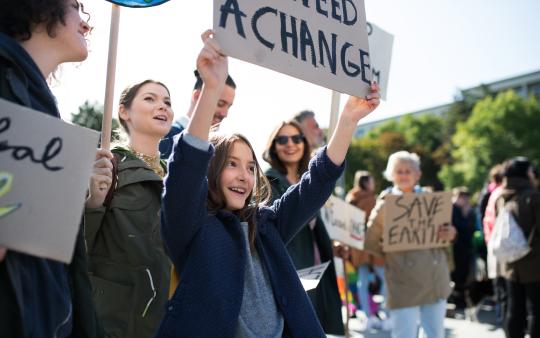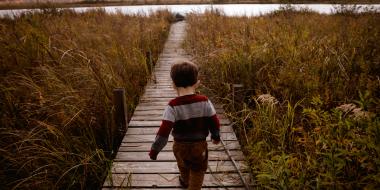*Article co-authored with Amira Abdelaziz.
There is growing awareness of and conversation about catastrophic problems that threaten the well-being of our world. Whether you care particularly about climate devastation, anti-Black racism, wealth inequity, lack of access to healthcare, or violence against people of different genders, these crises are related to one another, and inextricably linked to fundamental, systemic root causes. If we dig deeply enough, most of the injustices we see in our world are logical consequences of structures of white supremacy, cis-hetero-patriarchy, and capitalism.
I alone cannot change the world, but I can cast a stone across the waters to create many ripples. -Mother Teresa
This requires honest self-reflection and a willingness to look closely at the ways in which we personally contribute to and/or benefit from dominant structures of power, privilege, and oppression. These foundational underpinnings must be deconstructed and rebuilt to achieve justice for all: across generations, around the planet, and for all species. When framed that way, it can seem overwhelming, but someone, somewhere must start spinning the cycle of change.
As Mother Teresa once said, “I alone cannot change the world, but I can cast a stone across the waters to create many ripples.” Our actions need not be grandiose, and they need not be all-consuming, however, all of us can do something. We can each create our own ripple to instigate a wave of change, and best of all we can teach our little ones how to create those ripples too!
START SMALL
An action that upholds a particular cause or issue is called advocacy. Any advocacy effort, big or small, exerts a powerful influence that chips away at the dominant structures that create injustice. Skills of advocacy may be new to you, too. We live in a world where being “nice” and polite is rewarded more than speaking truth to power or challenging the status quo. Advocacy requires moral courage. Whether due to nature or nurture, some people are more comfortable speaking up. However, it’s important to push ourselves to the edge—even just one toe beyond—of our personal comfort zone, enough to expand ourselves and create a ripple, but not so far that our efforts are self-sabotaging or unsustainable.
There is a well-known parable attributed to the Quechuan people of South America that expresses how one person, regardless of their size or age, can make change. It goes something like this:
One day, an enormous fire erupted in the forest. All the animals were terrified and fled their homes, heading off to the river where they stood, watching helplessly, as the fire raged on. One little hummingbird, however, scooped up a few drops of water from the river, and flew back into the forest, dropping what it could carry onto the flames. It flew back and forth again and again. The other animals started to murmur amongst themselves, “What is she doing? She’s too small! The problem is too big! It’s just one drop. It’s not possible!” The hummingbird called out on one of her return trips, “I am doing what I can!"
The hummingbird showed incredible courage regardless of whether she would fail or succeed, and despite no one supporting or cheering her on. When you consider the acts of the hummingbird, ask yourself, despite the odds, who would you rather be? The hummingbird dousing a fire with droplets of water or an animal standing frozen at the shore? Which do you wish for your children to aspire to?
ADVOCACY ADVANTAGE
Although our children did not create the world’s problems or contribute to their causes, the future belongs to them. If we don’t equip them to be confident agents of change, they will become victims of others’ power. Even if our children are born with privilege, and benefit from the structures designed to perpetuate it, they are harmed by the way these systems cleverly make them complicit in promoting injustice, which ultimately harms us all.
Mental health concerns among youth are rising at an astronomical rate. Much is attributed to the growing awareness of young people of the urgency of the many intersecting global crises. As Joanna Macy described in her powerful book, Active Hope, action is a potent antidote to despair. Advocacy is associated with a sense of purpose, which is a predictor of wellbeing, and helping our children think critically about their world and advocate for change will give them the empowerment and liberation they need to thrive in their own lives and help others self-actualize.
Adolescent Advocacy All-Stars
Think you’re too young to make a difference? Many of us have heard of Greta Thunberg, but there are so many youth activists out there committed to having their voice heard! Maybe one day, your name will be added to the list!
Autumn Peltier
Autumn Peltier is an Indigenous teenager from Wiikwemkoong First Nation on Manitoulin Island on the land known as Ontario, Canada, who has been speaking out locally and globally since she was eight years old about the importance of ensuring that water is protected, and that all beings and ecosystems have sufficient access to clean water.
Lia Valente and Tessa Hill
Lia Valente and Tessa Hill, Grade 8 students, advocated to have the topic of consent explicitly included in the sexual education curriculum for schools in Ontario. They launched a petition for their proposal and were successful in ensuring that consent is now a core concept taught in schools.
US Students
US students walked out of classes in 2018 in response to a rash of mass shootings in schools to protest permissive gun laws that potentiate the violence. Unfortunately, they are up against a powerful pro-gun lobby, and policy has yet to change.
David Shepherd and Travis Price
David Shepherd and Travis Price organized their classmates in 2007 to wear pink in solidarity with a Grade 9 boy who was being bullied for wearing pink. Since then, “Pink Shirt Day” and other Anti-Bullying days occur around the world to raise awareness about and inspire action against the harms of bullying.
PARENTAL GUIDANCE
Here are three ways you can support your child's advocacy:
Listen Actively
When we, as parents, respond to our child’s cues, whether it be rushing to their side to quell tears or verbally empathizing with their big emotions, they learn that their voice matters. By respecting our child’s viewpoints and considering their feelings, even while setting appropriate boundaries around behaviour, we are providing opportunities for them to develop the confidence and skill to effectively speak their mind. When you actively hear your child, you are giving them the freedom to speak up. Even in small ways with small matters, speaking up freely feels good. Children are especially worth listening to because they often see things more clearly than adults who are deeply entrenched in dominant systems.
Further, responsive parenting is a tremendous boon to healthy self-esteem, which goes a long way in advocacy efforts. Whether it is a willingness to sit in protest during the national anthem or pledge of allegiance, or generating a solution to an ineffective school waste program, self-esteem provides the critical resilience needed to both effectively advocate, and to nurture acceptance when efforts appear to fail.
Encourage Critical Thinking
Critical thinking helps children question and challenge ideas that don’t fit with their evolving values. Start by helping children make sense of what they see, hear, and experience in the world, whether in the schoolyard or in the media. Rather than strictly limiting or heavily filtering what they consume, ask them what they think about it. When you invite kids to share their thoughts, you are showing them that their opinion matters. The tension created by a disconnect between values and perceived reality can motivate advocacy as a way to resolve it.
Set an Example
As parents, we are placed in the prime position to be role models to our children. What you say and do, how you approach advocacy in your own life, and what you value matters. Openly and thoughtfully discuss your own reactions to events in the world; this is a salient way by which family values are communicated to children. Talk to your children about your own advocacy efforts and invite them to participate. Be transparent about how you take action—in both large and small ways—towards change. One of the best ways we can demonstrate advocacy in a democratic society is through voting and engaging with legislators between elections. Include your kids in the process. Bring them with you when you vote; have them join you at town hall meetings; include their wisdom in letters you write to your representative.
THE GREAT DEFENDER
There are some basic steps that can help you support your child to plan an act of advocacy (tip: the same steps are just as applicable to “adult” advocacy):
Found Cause!
Is it the extinction of a species? The still-viable food that grocery stores throw away? The inaction of the government on limiting carbon emissions? Maybe it’s the sexist dress code at your child’s school. No matter the cause, it’s important to choose one about which you truly care, as your actions will be more sustainable if you are passionate. Help your child learn all they can about the subject: this is a great opportunity to teach them how to be critically analytical of written and online content. Research provides opportunities to discern which sources are reputable and reliable. No fake news here!
Resources of Inspiration
Check out these fabulous online initiatives to get your advocacy juices flowing!
- Beautiful Rising harnesses the insights of changemakers worldwide to help make our movements more strategic, creative, and effective. beautifulrising.org
- The Commons Library is an online collection of key lessons and resources of progressive movements. commonslibrary.org
- The Ruckus Society is a multi-racial network of trainers dedicated to providing the necessary tools, preparation, and support to build direct action capacity for ecological justice and social change movements. ruckus.org
- The Conscious Kid is an education, research, and policy organization dedicated to equity and promoting healthy racial identity development in youth. theconsciouskid.org
Squad Goals!
Think about what you want to change. What needs to happen for that to occur? Perhaps you want your town council to vote for a by-law that protects a local watershed. Or maybe you want your school to implement a compost system. Do your research and be specific about what you’d like to see happen as a result of your advocacy.
On Target!
Who has the power to effect the change you want to see? What do you want them to do? Perhaps a corporate CEO needs to be convinced that the packaging of their products needs to be reduced. Maybe your local government representative has the opportunity to vote for a particular law. Maybe you want individuals to bike to work instead of drive. Do you need to get your school’s custodian on-side for that compost system? It could be that you think people in your neighbourhood need to know more about the impact of systemic racism. Consider everyone who might be interested or able to help you get to your goal.
Music to Our Ears
Much of the popular modern music evolved from the rhythms created by enslaved people of African descent: songs that were infused with spiritual praise and resistance, and encoded instructions for liberation. Music continues to be a potent medium for advocacy, from the civil rights movement and peace anthems of the folk era to many rap lyrics today. Some artists and songs more explicitly call out problematic structures, while others are more subtly wrapped in bubblegum. Consider creating a playlist of protest music to listen to (and talk about!) in your family (streaming services often have some already made!). If you need some somewhere to start, songs like “Strange Fruit” by Abel Meeropol (performed by Billie Holiday), “Sound of Da Police” by KRS-One, “Blowin’ in the Wind” by Bob Dylan, and “Sit Still, Look Pretty” by Daya, will definitely get the conversation started!
Tactical Act!
What message is likely to change your target’s behaviour? Remember that tactics should change depending on how your target already feels about an issue. Does it require a letter-writing or social media campaign? Or would it be more beneficial to engage in direct action like inviting people to bring all their packaging back to a store at a particular time to show the impact? Book a meeting with your school’s custodian and principal to explain how and why you need to implement a compost system, and if that doesn’t work, start a petition of your classmates! Be creative: what skills or resources to you have? What brings you joy? If you love to dance, choreograph a flash mob! If you are a strong writer, create a template for a letter-writing campaign. If you get excited about social events, organize a community dinner to talk about a shared issue of concern.
Action Plan!
Work out the nitty gritty details. How many people do you need? What resources are required? How will you get the word out? Create a timeline and make a schedule. Who is responsible for what?
Changemaker in the Making!
Use this advocacy goal-setting chart to help you and your child brainstorm ideas on how they can start creating those ripples!
| How can you reach or empower vulnerable or marginalized communities with your action? | |
| Are there allied groups that should be consulted for this action? Community organizations, etc. Could they be engaged in this action? How will you connect with them? | |
| How many people do you need to pull this off? How will you recruit them and keep them committed? | |
| What are the roles for the action? (e.g., scheduling, spokesperson, marshals, media liaison, medics, documentation, etc.) | |
| What resources do you need in terms of time, money, people, equipment, skillset, etc. | |
| Does this action require a permit or police notification? | |
| To what degree are you motivated to/confident about actually pulling this off (0–10)? If it is less than 7/10, what is in the way? What would move this to a 10? |
While the current and constant news cycle can be disheartening, supporting kids to develop the knowledge, skills, and spirit to think critically and take action can spark tremendous change.
I long to accomplish a great and noble task, but it is my chief duty to accomplish small tasks as if they were great and noble. - Helen Keller
An infant learns that her voice is a cause for celebration, small children can be encouraged to question and act (and even say, “No!”), and older kids can step out into their world, equipped with strategies and confidence to speak up and agitate for a better one. And as Helen Keller famously proclaimed: “I long to accomplish a great and noble task, but it is my chief duty to accomplish small tasks as if they were great and noble.” Start small. Spark change. Teach advocacy. Take action. Create ripples. Make waves.
You may also enjoy: Supporting Your Child's Environmental Activism, Raising Kind Children Through Environmental Sustainability, and Five Ways to Connect with Environmental Organizations.






